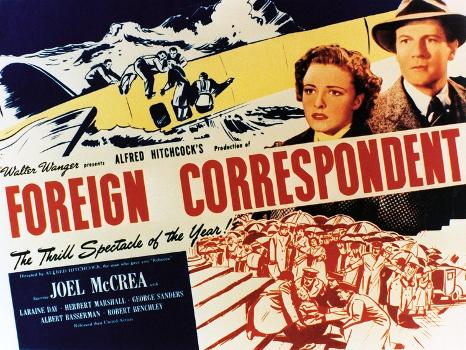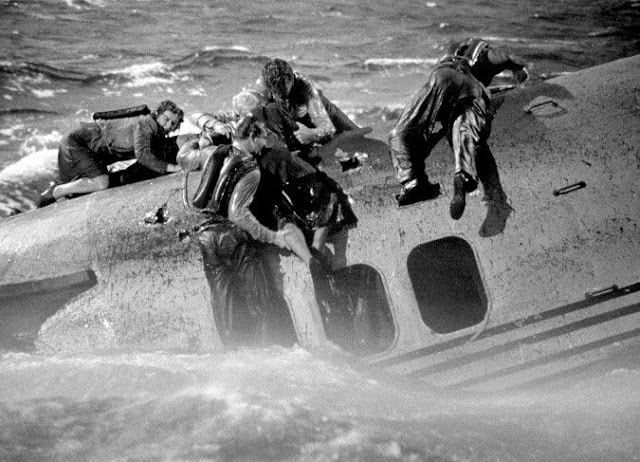In 1939 Alfred Hitchcock left the United Kingdom and took his directorial talents to Hollywood. He had cut his teeth on silent films in the early to late twenties, then transitioned into the sound era where he got a name for himself creating thrillers and political mysteries. Films like The Man Who Knew Too Much, Murder!, and Sabotage helped cement his expertise in the types of films that had audiences on the edge of their seats. As the Nazi party prepared for war and invasion Hitchcock relocated to America which, at the time, was not involved in the conflict. The first two films Hitchcock directed upon arrival in Hollywood, Rebecca and Foreign Correspondent, released in the same year and both ended up on the ballot for the Academy Award’s Best Picture. Hitchcock would also be nominated for Best Director that year for Rebecca but lost out to John Ford for The Grapes of Wrath. Rebeccatook Best Picture but that award was given to producer Walter Wanger. Still, the honor of having two of his films up for the top award in the same year is tremendous. Immediately he was cemented in the states as one of the greatest directors of all time, a distinction he would maintain for the rest of his life.
Foreign Correspondent is a timely picture, taking place in the summer of 1939 just before the outbreak of World War II. The USA was still about 18 months shy of entering the war themselves but the effects could already be felt and there was a growing dread over the rise of The Third Reich and the invasions in Europe. Many felt that the USA’s involvement was inevitable. Into that political climate Hitchcock released his film about a reporter being promoted to foreign correspondent and sent to London and Amsterdam to report on the conditions there.
John Jones (Joel McCrea), a crime reporter who recently got in a skirmish that may cost him his job, is surprised when he is called to the office of the head editor of the New York Morning Globe and offered a job to travel to Europe, under the pen name Huntley Haverstock, and interview a Dutch diplomat named Van Meer (Albert Bassermann) at a meeting and luncheon for the Universal Peace Party. A chance encounter with Van Meer prior to the luncheon nets Heverstock nothing as Van Meer expertly dodges answering any questions thrown his way by Huntley. At the luncheon, Van Meer skips out before his scheduled speech, ostensibly over a sudden illness, and the host, Stephen Fisher (Herbert Marshall) has his daughter, Carol (Laraine Day), speak in his stead. Huntley is smitten immediately upon seeing her but inadvertently insults her. He tries to make up for his mistake by asking her out to dinner and drinks.
Van Meer is next scheduled to speak in Amsterdam so Huntley travels there in the hopes of another opportunity to speak to the man but, upon arrival, is surprised the man doesn’t recognize him. A nearby photographer assassinates the diplomat and, after a lengthy chase wherein Huntley engages the services of Carol and a reporter friend of hers, Scott ffoliott (George Sanders), Huntley discovers that the man killed was a fake meant to throw the police off the scent while the real Van Meer is kidnapped. The kidnappers wish to force Van Meer to reveal a secret verbal clause in a treaty which would be triggered if Germany were to declare war.
The plot is very dense and full of twists and tense moments punctuated by moments of wry humor. Alfred Hitchcock knew how to juxtapose the two without undercutting the tension. A prime example of this is the scenes between Huntley and the “bodyguard” he has been assigned by Stephen Fisher. This phony bodyguard makes several attempts to kill Huntley ultimately settling on taking the man to the top of Westminster Cathedral Tower with the intent to push him off to his death. Throughout this scene he keeps getting interrupted by tourists or groups of children coming up for the view from the tower. You can see the frustration on his face as he keeps getting interrupted and has to keep coming up with excuses to prevent Huntley from going back down. It’s amusing but also adds to the tension as it draws out the murder attempt with several aborted attacks.
The identity of the traitor in the midst is revealed fairly early on, deflating that part of the mystery but it shepherds in a new dilemma for Huntley. With Stephen Fisher unmasked, Huntley must now tread lightly in his efforts to prove what he knows without tipping off Carol that her father is collaborating with the enemy. Scott ffoliott reveals that he, too, has figured out it is Fisher and the two scheme to keep Carol away long enough to allow Scott to use Fisher’s daughter as a bargaining chip to get him to confess and turn himself in. This fails and Fisher takes his daughter away on a plane to America just as Germany declares war. Scott and Huntley also manage to get on the plane and have made arrangements for it to be met upon landing and Fisher taken into custody.
The finale of the film takes place on this plane in what is perhaps the best staged scene of the entire film. It certainly is impressive for its time and still plays well today. The way Hitchcock filmed the attack on the plane and the crash into the ocean may not look photo realistic but it doesn’t need to. The cinematography and the actors sell the peril and, after the plane crashes into the ocean, the shots of the actors clinging to the wreckage is frightfully believable. While the plane is being attacked a passenger stands up and refuses to take any safety precautions only to get hit suddenly by machine gun fire from outside. It is abrupt and shocking, selling the dangers.
This is a lean, complicated mystery wrapped up in then current affairs and political intrigue. It is the type of drama that Hitchcock would become known for alongside his abilities to sell suspense and human danger. Between this and Rebecca it was a one-two knockout of a year for him in his introduction to American cinema. He would go on to decades of masterpieces as well as a few interesting failures and he continued to direct right up until the end of his life, retiring only when his health got so bad he could no longer do the work. He had a unique talent for filmmaking that is on clear display in this film and it is well worth seeking it out as a prime example of this genre and this time period in cinema.
Academy Award Nominations:
Best Motion Picture: Walter Wanger
Best Supporting Actor: Albert Bassermann
Best Original Screenplay: Charles Bennett and Joan Harrison
Best Cinematography: Rudolph Maté
Best Art Direction: Alexander Golitzen
Best Visual Effects: Paul Eagler (photographic) and Thomas T. Moulton (sound)
____________________________________________________
Release Date: August 16, 1940
Running Time: 120 Minutes
Not Rated
Starring: Joel McCrea, Laraine Day, Herbert Marshall, George Sanders, Albert Bassermann and Robert Benchley
Directed By: Alfred Hitchcock









Comments
Post a Comment